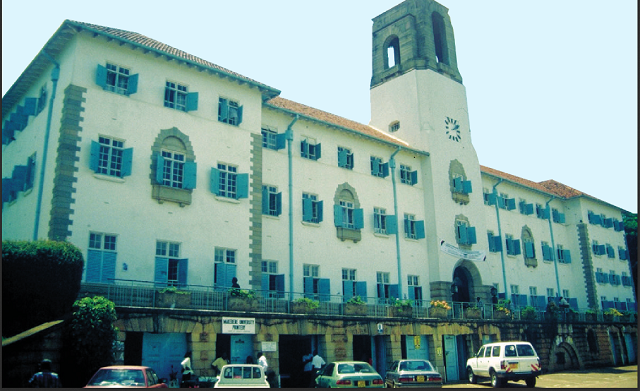
Makerere exposed
The Makerere University campus in Kampala has been a quiet and abandoned place since President Yoweri Museveni on Nov.01 ordered it closed after a strike by lecturers demanding pay was joined by a strike by students demanding lectures.
But the calm is a fake cover for the chaos on the hill. One person keenly aware of this is the university’s Vice Chancellor, John Ddumba Ssentamu; an elderly soft-spoken tall man with dark carefully dyed and combed hair, thick rimmed spectacles, and a gentle man. Even with the lecturers and students kicked off campus by the police, Ddumba continues to work.
“It has been too much. Yesterday it was the academic staff, the other day students. I heard the non-academic staff were planning to strike tomorrow,” Ddumba said recently.
The 63-year old Vice Chancellor went on: “You want Ddumba to go. Yes he will go but the problems will remain. Vice chancellors come and go. I came and I will go but strikes will not stop.”
Looking at him, one sees a man convinced that he has done his best but is not appreciated or respected for it. Unfortunately, he is right.
The latest strikes will not be the last at Makerere in what is becoming a culture at the hill. But this is the second time in 10 years that the university has been closed. Usually, if the strikers are students, they are confronted by police firing teargas, live bullets and brandishing whips and batons. If it is either the lecturers or the non-teaching staff striking, they are normally promised that their pay demand would be addressed. In all cases, the strike is often called off after a few days and classes resume.
In August, a 17-day strike by the non-teaching staff was only called off after President Museveni promised to remit up to Shs41 billion to them by December which included Shs28 billion salary arrears and Shs13 billion allocated for salary enhancement.
This time it appears Ddumba and the government are determined to ensure that something changes at Makerere.
That is possibly why Ddumba issued a directive for all lecturers to return all university property, including 375 motor vehicles. But only five lecturers had complied. Many obviously think it is business as usual.
There is also confusion on the government side. After kicking intern doctors from the university medical school out of hospitals, the government was recalling them because of the void created.
Meanwhile, it remains unclear when the university would re-open. This has led some students to protest in the city for it to reopen. They have been running battles with the police and Ddumba is frustrated. He is being blamed for everything. Convinced of his own uprightness, he was looking forward to a Commission of Inquiry in the Makerere affairs proposed by President YoweriMuseveni to absolve him.
After over 40 years in academia, including publication of highly respected books on economics and management, and sitting on the boards of top corporations, Ddumba possibly thought his good intentions would be enough to solve problems at Makerere. They have failed. And he knows the battle will continue when the university re-opens. Unfortunately, it appears, Ddumba with all his well-pressed suits and intentions is in no mood for more fights and possibly feels he is paying a high price for his job.
Makerere shunned
The university too is paying a heavy price for its culture of chaos. Although many parents who are alumni of the so-called `Havard of Africa’ still attach sentimental attachment to it, a younger generation are looking elsewhere for quality education.
According to Prof. Venansius Baryamureeba, a former vice chancellor whom Ddumba succeeded, some Makerere University departments are facing a decline in registering private students. The university currently has 39,000 students, most of them self-sponsored.
Writing in the Daily Monitor newspaper, Baryamureeba says departments like the College of Computing and Information Sciences and the College of Business and Management Sciences have registered a drop in private students’ numbers to less than 50% of what they were three years.
In response, the Makerere administration, led by the Deputy Vice Chancellor in Charge of Finance and Administration, Prof. Nawangwe, keep reciting tertiary rankings, local and international that place Makerere among the top universities in Africa. The most favoured ranking is the one is Times Higher Education list of 2016, which placed Makerere in fourth place, after the University of Cape Town, the University of Witwatersrand and Stellenbosch University, all from South Africa.
However, such ranking only offer a thin veil for an institution that is trouble. As one writer in the online University World News magazine wrote under the title “Is benchmarking more useful than ranking”, they do not always serve as the best proxy of the quality and relevance of tertiary education institutions.
“Let’s keep in mind that any ranking is, at the end of the day, an arbitrary arrangement of indicators aimed at labeling what is pre-defined by the ranker as a ‘good’ educational institution.
It goes on: “The emergence of this rankings obsession, at the same time raises legitimate concerns about their misuse, especially when they are used solely for promotional purposes, or, even worse, when they become the main driver of policy decisions for governments and tertiary education institutions.”
The article notes that rankings tend to equate institutional quality with research productivity, which is measured either by the number and impact of their publications in peer-reviewed journals, or the selectivity of their admissions processes. This downgrades institutions that place greater emphasis on teaching. According to critics, this is Makerere biggest problem.
 The Independent Uganda: You get the Truth we Pay the Price
The Independent Uganda: You get the Truth we Pay the Price



